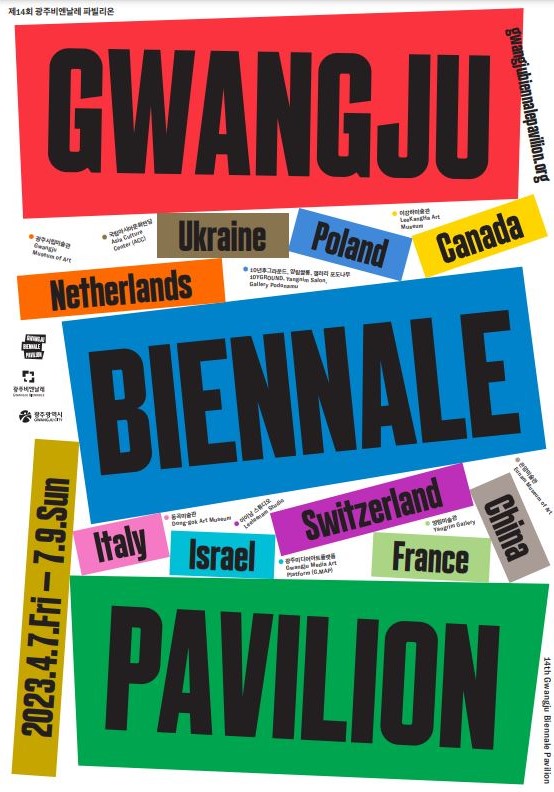Press
Resource Center
14th Gwangju Biennale Pavilion Opens
Exhibitions, performances, and public programs by nine participating countries

Gwangju Biennale Pavilion poster. Courtesy the Gwangju Biennale Foundation
The Gwangju Biennale Pavilion, featuring leading cultural and art organizations from Korea and other countries, will hold an opening ceremony to welcome visitors to the 14th Gwangju Biennale. Throughout the biennale, running April 7 to July 9, the entire city of Gwangju will be transformed into a site of cultural and artistic diversity, presenting contemporary art from around the world.
The Canadian Pavilion (April 7–July 9, LeeKangHaArtMuseum) presents Once a Myth, Becoming Real, featuring more than 90 drawings and sculptures by 32 Kinngait artists. The artworks include reinterpretations of traditional themes in Inuit art as well as Quvianaqtuk Pudlat’s wild Arctic animals living in Kinngait, Nunavut. It will be the first and largest exhibition on Inuit art to be held in Korea.
The Chinese Pavilion (April 7–July 9, Eunam Museum of Art) presents The Spirit of Bamboo: “Bamboo” from Contemporary China, themed after the trees that have had the deepest influence on Chinese civilization. While creating a contemporary space, the exhibition will visually convey the harmony of tradition and modernity through sculptures and images.
The French Pavilion (April 7–July 7, Yangrim Gallery) brings an adaptation of Zineb Sedira’s exhibition, Dreams Have No Titles, which received a special mention of the jury at the 59th Venice Biennale. This exhibition will present an immersive experience, combining fiction and reality and autobiographical confessions and documentary films. The first floor will contain a recreation of Zineb Sedira’s studio, introducing the production process behind Dreams Have No Titles. The basement floor, converted into a movie theater, will screen video artworks.
The Israeli Pavilion (April 7–July 9, Gwangju Media Art Platform) presents Irregular Objects, which explores the relationship between humans and the nature of objects through videos, objects, and installations. Alona Rodeh’s Runway Freefall (2022) creates a surreal urban landscape operated by machines while Shachar Freddy Kislev’s Shoos (2016), a video work based on scientific illustrations, resonates with the exhibition space that is ideal for media artworks.
The Italian Pavilion (April 7–July 9, Dong-gok Art Museum) explores a sustainable and harmonious future from multiple perspectives in the exhibition What does water dream, when it sleeps? Using water as a metaphor, five artists present artworks envisioning the possibilities in the relationship between humans and nature, from post-anthropocentric viewpoints.
In the Netherlands Pavilion (April 5–July 30, Gwangju Museum of Art), Radha D’Souza and Jonas Staal will present Court for Intergenerational Climate Crimes (CICC): Extinction Wars, featuring evidentiary hearing performances. Running April 7–9 from 2 p.m. to 5 p.m. Various social campaign groups and activists will testify to the ways in which the state and corporations are committing climate crimes within a Korean context.
As part of Postartistic Assembly (April 7–July 9, Gallery Podonamu and May 5–May 7, 10YGROUND, Yangnim Salon), the Polish Pavilion will run public programs related to Jerzy Ludwiński, an art critic who introduced the term “post-art,” from at 10YGROUND and Yangnim Salon. Gallery Podonamu will exhibit works by the Ukrainian collective, Freefilmers, to show support for and solidarity with Ukraine.
The Swiss Pavilion (April 7–July 9, Leeleenam Studio) presents a new rendition of the 2022 exhibition Spaceless, which features some 50 photos and videos by eight young artists from Switzerland and Korea. Including works by prominent Swiss photographers such as Florian Amoser and Alexandra Dautel, the exhibition will share various artistic viewpoints around the digital transformation of urban environments and human consciousness together with the resulting social changes. This new edition to be shown at the Gwangju Biennale, commemorates the 60th anniversary of diplomatic ties between the Republic of Korea and Switzerland.
The Ukrainian Pavilion (Every Saturday, April 7–July 9, Asia Culture Center) will screen modern Ukrainian films under the theme of Ukraine: the territory of freedom. Olesya Morgunets’ Carol of the Bells (2021), Maksim Litvinov’s Mariupol. Unlost Hope (2022), and Mykhailo Illienko’s Toloka (2020) will be screened every Saturday.
Park Yang-woo, President of the Gwangju Biennale Foundation said, “The Gwangju Biennale Pavilion will present a valuable opportunity for local residents and the public at large to enjoy a diversity of art from outside of Korea.”
Notes to Editors
For general inquiries regarding the Gwangju Biennale Pavilion,
please contact Jamie Mun at jamie.mun@gwangjubiennale.org or Elisa Lee at elisa.lee@gwangjubiennale.org
For inquiries regarding a specific pavilion, please contact the persons indicated in the supplementary material.
Websites:
www.gwangjubiennalepavilion.org